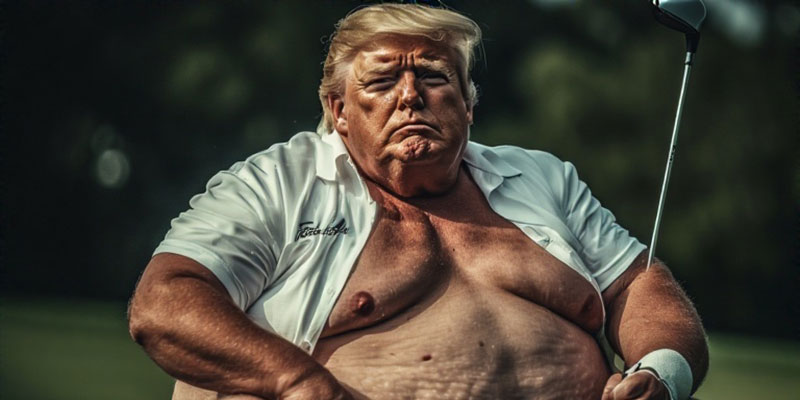In what might generously be called a visit, Donald Trump recently descended upon Scotland, ostensibly to admire the lush lawns of his luxury golf resorts in Aberdeenshire and Ayrshire. What unfolded, however, was a theatrical performance—less “statecraft” than stagecraft—complete with a militarized security perimeter, meticulously curated photo ops, and the relentless thrum of distraction, as if the mere act of swinging a club could drown out the groans of a collapsing empire.
While Trump wandered the greens flanked by his son Eric and the U.S. ambassador, grinning beneath sunglasses like sentient gold-plated mannequins, the Scottish countryside became a set piece in an ongoing drama of delusion. Police officials screeched about “public safety,” as thousands of officers were yanked from communities and shipped across the country to protect a private citizen from imaginary mobs. Government figures bellowed patriotic nonsense, invoking “diplomatic norms” with all the gravitas of a malfunctioning theme park animatronic.
Local leaders, drenched in desperation and lured by the wafting scent of tourist cash, oinked their support for the former president’s visit. They spun overwrought tales of “economic revitalization,” despite the fact that many of Trump’s Scottish ventures have hemorrhaged cash and shredded ecological protections like wet receipts. Meanwhile, corporate media outlets grunted out reverent praise, their microphones lovingly aimed at golf balls and irrelevant soundbites.
But in the margins of this grotesque celebration of narcissism, real life went on. Protesters from across Scotland gathered in the streets with a quiet, grounded conviction. Their signs carried more wisdom than every press release combined. “Gaza Is Not For Sale” read the crimson letters painted defiantly onto the lawn at Turnberry, a poetic strike against a real estate philosophy that views both land and human lives as assets to be flipped. Local activists, artists, poets, and students walked side by side, not screaming, but listening—to each other, to the land, to the deep moral call to reject cruelty masked as commerce.
They stood not against one man, but against a system that births men like him. Against a machinery of politics that thrives on spectacle and forgets substance. Against the faux-leadership that jets across oceans to admire fairways while refugees drown, forests burn, and the poor are criminalized for their poverty.
Across from the protest lines, media outlets wheezed out segments about Trump’s golf swing. Anchors blubbered inquiries about his polling numbers, tiptoeing past the deepening Epstein scandal like it was a puddle instead of a crater. In the background, Ghislaine Maxwell’s lawyer grunted darkly suggestive phrases about “cooperation” and “clemency,” while Trump himself howled vague promises of future pardons, like a king tossing bones to the crowd.
Government agencies and party spokespeople—both Conservative and Labour—screeched their way through a series of press statements so empty, they practically floated away. One Labour minister grumbled that protests were “unhelpful.” The Prime Minister’s office shat out a tone-deaf statement about “maintaining ties,” oblivious to the human cost of transactional diplomacy.
And yet, for all their noise, it was the stillness of the citizens that resonated most. A woman in Edinburgh, standing barefoot in the grass, simply stated, “We are not here to win. We are here to be true.” Her voice, steady as a stone in a river, revealed a truth no blaring siren could cover: that power, when detached from humility, is no power at all.
The Trump visit is not an aberration. It is the logical outcome of a world shaped by capital, ego, and spectacle. His golf swing is irrelevant. What matters is the political machine that airlifts him across the Atlantic to remind us that the empire never ends—it just changes costume.
But something deeper stirred beneath the tartan banners of protest. A movement unchained from ideology, undistracted by electoral theater. A remembering. An echo of a truth that predated governments, corporations, borders, and brands. That we are not isolated individuals scrapping for status, but participants in a living whole—each act of kindness, resistance, or witness rippling far beyond what the cameras can capture.
Real change does not come from replacing one face with another. It does not arrive wrapped in the flag of a party, nor does it bloom on a golf course ribbon-cutting. It comes from the dissolution of illusion. From seeing clearly that our institutions are not broken—they are designed this way. They feed on noise, distraction, and division. They reward cruelty masked as strength and punish compassion as weakness.
There is a revolution far quieter than mobs and far deeper than slogans. It begins in attention, in compassion, in radical honesty. In the refusal to play the game at all. It is not a movement that can be televised. But it can be lived.
And it was lived this week, not by the man with the motorcade, but by the teacher who held a student’s hand at a protest. By the grandmother who cooked for the marchers. By the artist who painted truth across a billionaire’s lawn. In the shadow of spectacle, humanity still grows—patient, resilient, and unafraid.
Footnotes:
- “Trump golfs in Scotland as Epstein questions persist,” Reuters
- “Trump plays golf in Scotland while protesters take to the streets and decry his visit,” AP News
- “‘People have seen through him and he’s not welcome’: Scotland tees up for Trump visit,” The Guardian
- “Ghislaine Maxwell’s lawyer suggests possibility of presidential pardon as Trump says it’s ‘not the time’,” The Guardian
- “Turnberry Golf Course’s Environmental Violations,” The Times
- “Thousands of Police Redeployed for Trump Visit,” The Independent
- “Grassroots Resistance Grows in Scotland,” Various Local Scottish News Reports
- Anonymous firsthand accounts and public protest observations from community reporters.
